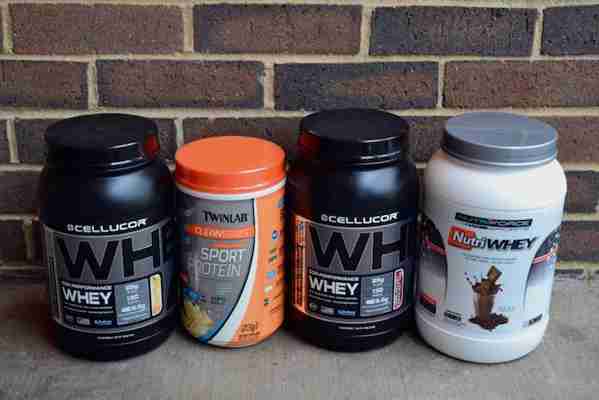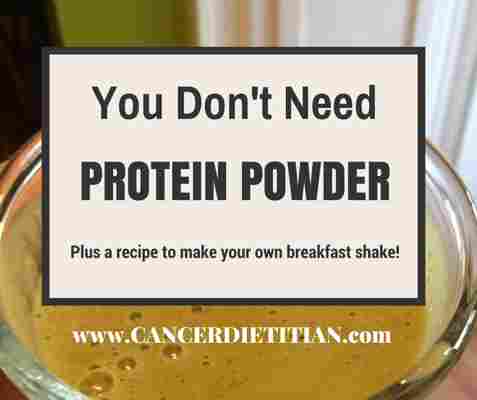5 Reasons Why You Should Stop Using Protein Powder
Across the internet, there are innumerable articles on how to use protein powder in your diet. From protein smoothies to protein pancakes, the recipes are abundant. Here’s the thing: there are no benefits to using protein powder. Don’t believe me? Just read.

1. You don’t need the extra protein
Unless told otherwise by a physician or dietitian, only about 15 percent of your daily caloric intake should come from protein. This is because we metabolize carbohydrates first, then fats as a backup, and then protein as an absolute last resort. Protein metabolism itself uses up more energy than it gives back to the body, making it a super inefficient, minor fuel source.
2. More protein does not mean more muscle
Yes, you read that correctly. Eating more protein than you need will not build muscle mass. You know what will happen, though? All of that extra protein will be converted into and stored as fat in your body.
3. It’s extra work for your liver and kidneys
Increased protein intake = increased urine output = increased risk of dehydration and sad organs. Combat that with these five foods to help you fight dehydration.
4. It’s not regulated by the FDA
Supplements do not need FDA approval before production or marketing. The safety and effectiveness of these products can’t even be evaluated until after they reach consumers. So your post-workout protein shake is probably a 28-ounce bottle of lies.
5. It’s expensive
Prices for protein powders range from $12 to $100. For something that your body does not need, it sure does cost a lot. Think of all the other things your money could be used for instead of being wasted on this stuff.
If you’re serious about building muscle, then you need to focus on eating a balanced diet. Think of it this way: your body needs to have a solid foundation and enough materials before it can start expanding. So find out how much protein you actually need and go get huge.
The scary stuff hiding in your protein powder shakes (and what to drin
Quick Take

Protein, protein, protein.
When you switch to a plant-based diet, you may worry about meeting all your protein requirements. Do you need to drink vegan protein powder shakes now that you're not eating meat. No, you do not! Yes, protein is important -- but you're most likely getting "enough" protein on a plant-based diet, without supplementing. And protein powders (even the "plant-based" ones) are best avoided altogether. Here's why.
On this page
Before We Begin: A Gift For You
What is protein and why do I need it?
OK, before we break down why you don't need vegan protein shakes, let's do a quick review on what protein is exactly.
Protein is an essential nutrient for human life. Dubbed “the building blocks of life,” protein, like carbohydrates and fat, is a macronutrient. Macronutrients give the body energy (by way of calories). Your body needs lots of macronutrients to keep this train going. Chemically speaking, protein is composed of the amino acids: carbon, hydrogen, nitrogen, oxygen, or sulfur.
We use protein to build muscle mass, but that’s not all we use it for.
Your body puts protein to work in nine essential ways:
to grow and repair tissue
to aid important biochemical reactions
to facilitate communication between cells
to act as a structural framework within your cells
to regulate proper pH balances within your blood
to maintain your body’s fluid balance
to transport and store nutrients
to form antibodies to fight infection
and (last but not least) to give your body energy.
Protein has also been linked to weight loss through improved metabolism and reduced appetite.
How much protein do I need?
We hear this a LOT for plant-based beginners...and the answer may surprise you as it's not as much as you might think!
Only 3% of America is protein deficient, and those people typically don’t consume enough calories. (By the way, Americans are 97% fiber deficient and 98% are potassium deficient).
Protein deficiencies can be found in elderly people with hindered appetites, individuals with eating disorders, or those who are impoverished.
If you’re vegan, or plant-based and you consume enough calories for your BMI, you don’t have to worry about “getting enough protein.”
Did you know plant-based dieters (vegetarians, vegans, pescatarians, WFPB dieters, etc.) get about 70% more daily protein than their bodies need? This is roughly the same daily protein intake consumed by those with traditional omnivorous diets.
How to calculate your protein needs
Your protein needs depend on your activity level, age, and other factors, but a good rule of thumb to calculate recommended daily protein allowance is to take your body weight (in pounds) and multiply it by 0.36. This will give you approximately how much protein you need (in grams).
If you weigh 165 pounds then your protein requirement would be...
165 x 0.36 = 59.4 grams of protein per day.
Or just 2 cups of edamame. That’s it!
(Try our handy protein calculator here.)
Is there such a thing as “too much protein”?
While people tend to get stuck on meeting protein needs, it’s not all fun and gainz. There is such a thing as too much protein - and it can have serious health consequences.
Most Americans are eating far too much protein. Research shows those with diets extremely high in protein are five times more likely to die from cancer and 23 times more likely to die from diabetes.
The culprit? Animal protein.
An overconsumption of animal protein leads to fatal diseases, particularly cancer, while an overconsumption of plant protein does not. (And considering the high fiber content in most protein-rich plant foods, you’d be uncomfortably full before you ever got close to dangerous levels of protein intake).
What is in your protein shake?
(… you don’t want to know)
Many popular protein powders contain whey and casein - both animal products derived from cow's milk. Too much whey can lead to digestive issues and acne, while casein is linked with in cancer.
Not to mention, protein powder often contains fillers, gums, high amounts of processed sugar, and empty calories. This can lead to fat storage in the body, spiked glucose levels, and inflammation (which is the LAST thing you want as an athlete or if you're trying to lose weight!).
And for those who think your vegan protein powder is healthy studies find that whey and sugar aren't the only toxin added to these protein powders:
“Earlier this year, a nonprofit group called the Clean Label Project released a report about toxins in protein powders. Researchers screened 134 products for 130 types of toxins and found that many protein powders contained heavy metals (lead, arsenic, cadmium, and mercury), bisphenol-A (BPA, which is used to make plastic), pesticides, or other contaminants with links to cancer and other health conditions. Some toxins were present in significant quantities. For example, one protein powder contained 25 times the allowed limit of BPA.” - Harvard Health Publishing, Harvard Medical School
Yikes!
The ultimate whole food plant-based protein shake recipe
Boost your workout with plants, no processed powders. This whole food plant-based protein shake recipe contains 35 whopping grams of vegan protein per serving -- no casein, no whey, no toxins!
1 ½ frozen ripe bananas (peel, chop, and freeze after buying) 3 Tablespoons of all natural peanut butter 3 Tablespoons of hemp seeds 1 teaspoon of flaxseed 1 ½ cups of unsweetened soy milk 2 dates (pitted, soak for a smoother texture) 1 cup of raw spinach
Blend ingredients until smooth. Blend an additional 30 seconds.
Excellent Source of Dietary Fiber, Excellent Source of Protein, Excellent Source of Vitamin A, Excellent Source of Vitamin C, Excellent Source of Calcium, Excellent Source of Iron
Get 10% off athlete meals, delivered!
Say goodbye to chalky and unhealthy protein powders and say hello the MamaSezz Peak Performance Bundle -- ready-made meals delivered to your door and specially formulated for whole food plant-based athletes.
Use code POWER for 10% off your first Peak Performance bundle.
Key Takeaways
Protein is important for healthy bodily function and growth -- but chances are you're getting enough.
Most Americans (including vegans) get well over the RDA of protein so time to stop stressing about where you'll get your protein!
Protein powders (even "plant-based" ones!) are often filled with ingredients that are counterproductive to your workout and weight loss goals as they can even cause inflammation (which will increase your recovery time and can cause disease!)
Swap your protein powders for whole plant-based foods.
Enhance your athletic performance, no protein powders necessary! Order the MamaSezz Peak Performance Bundle for whole food plant-based meals loaded with ingredients scientifically proven to enhance athletic performance. Use the code: POWER to get 10% off your first Peak Performance Bundle!
Don't forget your Free DOWNLOAD
By Caroline DiNicola Fawley
Caroline is a plant-based chef, recipe designer, and whole food plant-based nutrition educator, with a Plant-Based Nutrition Certificate from the T. Colin Campbell Center for Nutrition Studies.
3 Reasons You Don’t Need Protein Powder
“I drink a protein shake in the morning. Is it good for me?”

This is a very common question that I am asked during or after my nutrition seminars. Usually the person bought the protein powder from a friend or family member, or a “health store” or “nutrition store” employee. They were probably told that drinking the shake will make them feel fuller, give them all kinds of vitamins, help build muscle and possibly assist with weight loss.
Unfortunately, those claims are not proven, nor regulated! Actually, many claims on food packages and supplements don’t have ANY proof. When it comes to supplements, there is very little regulation so you can’t be sure of what you’re getting. This lack of a regulation can result in contamination, as occurred in 2010 with two protein supplements containing unwanted levels of lead, cadmium, mercury, and arsenic.
Here are 3 reasons that you probably do not need to use protein powder in your daily routine:
Most people already eat enough protein.
Did you know that a normal, healthy individual only requires 0.36g per pound of body weight each day? For someone who weighs 150 pounds, that’s 55g per day. It actually doesn’t take much food to give you 55g of protein. A 3-ounce portion of chicken provides about 25 grams of protein; 2 eggs provide around 12 grams and 1 oz of almonds gives 6g. [For more on how much protein is in different foods, check out my blog post on protein in foods, which includes lists and charts!] The Institute of Medicine also provides a recommended range for protein intake, suggesting protein should make up 10% to 35% of your total calories. If you take in 2,000 calories, this translates to a range of 50 to 175 grams of protein.The truth is that average protein intake in America is more than adequate.There’s not a need for protein shakes unless there’s something that keeps you from eating enough food. Sometimes people going through cancer treatment, or having side effects after it’s over, cannot eat enough food or protein, because of difficulty eating or swallowing, or because nothing tastes right. In these cases, the meal supplements can help make up deficits. Eating protein from real food gives you extra nutrients in addition to protein.Some use protein shakes in place of meals. The problem with this is that real food gives you a wide variety of nutrients. The chicken not only gives you protein, but it also provides vitamins and minerals. Eggs give choline and healthy fat along with the protein. Along with protein, almonds have fiber, b vitamins, vitamin E and plant nutrients called phytochemicals. All of these nutrients are essential for optimal health. Our bodies prefer to get our nutrients from food, not pills or powders.
You get more bang for your buck by choosing real food sources of protein, rather than powders and shakes. Protein powders often have additives your body doesn’t need.Depending on the brand of protein powder that was sold, it may or may not have to meet the same FDA (Food and Drug Administration) regulations as “conventional” foods and drug products. If you choose to use protein supplements, always read ingredient lists to make sure you know what you are consuming.If you don’t recognize something, consult with someone who knows (preferably not the person selling you the product!). Often they add a bunch of artificial sweeteners and powder versions of vitamins. These might not cause harm, but they’re not doing anything to help you.
Make Your Own Shake!
Instead of buying the protein powder, I suggest you make your own protein shake out of real food!
Try out this simple recipe that gives you protein and other nutrients from real food. Plus, it tastes DELICIOUS!
Chocolate Banana Shake Recipe Chocolate Banana Shake Recipe 1 medium banana (frozen)
1 Tbsp peanut butter
1 cup milk (skim, 1% or soy)
1-2 tsp cocoa powder
1 cup spinach
ice (if desired) Put all ingredients in the blender. Blend and ENJOY!
This real food shake with no added sweeteners gives you:
15g protein,
1100mg potassium,
vitamin A (68%),
vitamin C (35%),
Vit D (25%),
Calcium (35%),
vit b-6 (45%),
300 filling calories
only 2.2g saturated fat
THAT is what you can call a “health shake”!
– Julie
If you want more information, I found these science-based articles to be helpful:
More on supplement: FDA information site on supplements and regulations

